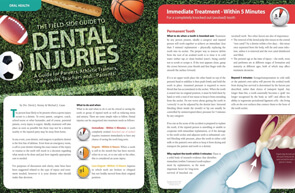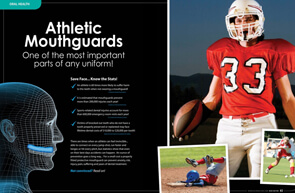Sports dentistry & Occlusal Disease
A mouthguard is a specially made, rubber-like cover which fits exactly over your teeth and gums, cushioning them and protecting them from damage.
It is important to wear a professionally made mouthguard whenever you play sport that involves physical contact or moving objects. This includes: cricket, hockey and football – which can cause broken and damaged teeth; and American football, boxing and rugby – which can all cause broken or dislocated jaws. A mouthguard will help protect against these events.
Your dentist will be happy to make you a custom-made mouthguard, which will fit your mouth exactly and protect your teeth and gums properly. Custom-made mouthguards can prevent damage to the jaw, neck and even the brain – helping to prevent the concussion and damage caused by a heavy blow.
Depending on your age, your mouthguard may need replacing fairly regularly. If you are still growing, new teeth will come through and move into position. So the mouthguard may become too tight or loose, and will need to be remade to fit the new shape of your mouth.
Adults may not need to have their mouthguards replaced quite so often. But they are like any other form of sports equipment and will suffer from wear and tear. It is recommended that you take your mouthguard along to the dentist when you go for your check-up, so it can be checked.
Related Dental Emergencies Articles
Dental injuries incurred during sports activities are highly treatable, and can involve positive outcomes if participants act quickly to see a dentist after an injury. However, if not treated quickly these kinds of injuries can lead to discomfort, embarrassment and a lifetime of dental costs... Read Article
Accidents to the teeth, jaws and mouth can happen at any time during any sporting activity. Proper attention can save pain, alleviate anxiety and costly dental treatment. A little knowledge, as they say, can go along way. This field-side guide briefly explains some simple rules to follow when dealing with different dental injuries and when you need to see the dentist... Read Article
There are times when an athlete can feel invincible... able to connect on every jump-shot, run faster and longer, or hit every pitch, but statistics show that even on their best days accidents can happen. An ounce of prevention goes a long way... For a small cost, a protective mouthguard can prevent excess anxiety, risk, injury, pain, suffering, and years of dental treatment... Read Article
Occlusal disease is a common and potentially destructive oral health condition that results from a misaligned bite. This condition often goes undiagnosed as early signs are often dismissed as natural ageing or normal wear and tear. However, if left untreated, occlusal disease can lead to severe long-term consequences such as tooth loss.
The most common causes of occlusal disease are an unbalanced bite, crooked teeth, and involuntary grinding or clenching of teeth. Symptoms of occlusal disease include abnormal wear and fractures of natural teeth, tooth sensitivity, shifting of teeth, gum recession, jaw joint pain, and unexplained headaches.
Occlusal disease can be diagnosed during a comprehensive dental examination and interview. Treatment options for occlusal disease include orthodontics, equilibration or bite balancing, prosthetics or restorations, and nightguards to manage teeth grinding.
In some cases, the act of clenching the teeth can activate a reflex, leading to increased muscle activity and reflex responses. This effect can be beneficial in certain situations in sports that require rapid reflex responses, such as martial arts or boxing, where clenching the teeth can potentially enhance some aspects of athletic performance.
However, in the case of occlusal disease, clenching and grinding can worsen the condition by increasing the forces placed on the teeth, muscles, and jaw joint. This can result in abnormal wear and tear on the teeth, fractures, tooth mobility, and severe localized bone loss around the teeth. Therefore, it is crucial to manage clenching and grinding habits, especially in individuals with occlusal disease, to prevent further damage to the oral structures.
Overall, while the Jendrassik reflex and the act of clenching teeth can have positive effects in certain situations, it is important to understand the potential negative effects of these habits on oral health, particularly in the case of occlusal disease. Regular dental check-ups can help diagnose and manage occlusal disease and other oral health conditions
In conclusion, it is essential to regularly schedule routine dental appointments to allow dentists to detect common symptoms of occlusal disease and begin treatment immediately to prevent long-term damage. If you suspect that you have occlusal disease, seek professional help as soon as possible.
- Restricted Envelope of Function: The "envelope of function" refers to the range of movements and positions that the mandible (lower jaw) can comfortably and harmoniously perform. When the envelope of function is restricted, it means that the jaw's movements are limited or hindered. This restriction can occur due to various factors, such as improper occlusion (bite) or temporomandibular joint (TMJ) disorders. It can lead to functional problems, discomfort, and abnormal wear of the teeth.
- Frimitus: Frimitus, also known as fremitus, is a term used to describe the palpable or perceptible vibration or movement of teeth when they come into contact during certain jaw movements. Excessive frimitus can occur when there are irregularities in the occlusion or tooth alignment, resulting in abnormal forces and movement during chewing or biting. It can be an indicator of occlusal disease or dysfunction.
- Incisal Tooth Surface Loss: Incisal tooth surface loss refers to the wear or loss of the biting edges or surfaces of the incisor teeth (front teeth). This can occur due to various factors, such as tooth grinding (bruxism), malocclusion (misalignment of teeth), or habits like nail biting. Incisal tooth surface loss can affect the appearance of the smile, cause tooth sensitivity, and disrupt proper functioning of the bite.
- Decrease in Intercanine Width: Intercanine width refers to the distance between the canines (pointed teeth) on both the upper and lower dental arches. A decrease in intercanine width can result from the loss of vertical dimension or vertical overlap of the teeth (overbite) due to a loss of occlusal vertical dimension (OVD). Occlusal disease, which encompasses various conditions affecting the bite and occlusion, can contribute to the decrease in intercanine width.
- Restricted Envelope of Function: A loss of OVD and occlusal disease can restrict the jaw's range of motion, leading to difficulty in chewing, speaking, and other oral functions. It can cause muscle pain, TMJ disorders, and overall discomfort in the jaw joint area.
- Frimitus: Occlusal disease can result in excessive frimitus, meaning that the teeth may come into contact with excessive force or in abnormal ways during biting or chewing. This can lead to tooth mobility, sensitivity, and further wear or damage to the teeth.
- Incisal Tooth Surface Loss: A loss of OVD and occlusal disease can contribute to incisal tooth surface loss, as improper alignment or excessive forces can cause premature wear of the incisor teeth. This can affect the esthetics of the smile and may require dental intervention to restore the function and appearance of the affected teeth.
- Decrease in Intercanine Width: Loss of OVD and occlusal disease can lead to a decrease in intercanine width as the vertical dimension collapses or becomes misaligned. This can result in changes to the overall bite and occlusion, affecting the stability of the teeth, jaw alignment, and overall oral function.
In summary, a loss of OVD and occlusal disease can have a significant impact on the function, aesthetics, and overall health of the oral cavity. It is important to address these issues through appropriate dental treatment and management to restore proper occlusion, alleviate symptoms, and prevent further complications. Consulting with a dentist or a specialist in occlusion (prosthodontist or orthodontist) would be advisable for a thorough evaluation and appropriate treatment options.
Back to Treatment Book an Appointment

